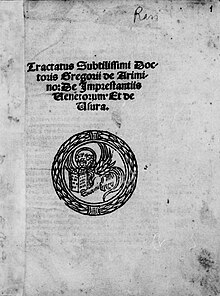Gregory of Rimini
Gregory of Rimini (also de Arimino, Ariminensis, Lucerna splendens, Doctor acutus, Doctor authenticus) (* around 1300 in Rimini , † late 1358 in Vienna ) was a philosopher and theologian and member of the Augustinian hermits .
Life
After completing his basic training, he studied in Paris (from 1322/23 to 1328/29). He worked as a lecturer in Bologna (attested in 1332, 1333, 1337), presumably in Padua, in Perugia and probably came to Paris between 1340 and 1342, where he worked out his sentence commentaries and probably presented them in 1343/44. In 1345 he acquired the degree of theological master's degree. In 1346 he was in Rimini, from 1347 in Padua until 1351, after which the Basel General Chapter sent him to the newly established study center in Rimini. In 1357 he became General of the Augustinian Order as the successor to Thomas of Strasbourg .
plant
His philosophical-theological works combine ideas of Wilhelm von Ockham and Petrus' aureoli . In addition to his main work, the sentence commentary, Gregor wrote written comments and letters as a general of the order as well as several treatises, including De usura and as an extract from the sentence commentary De intensione et remissione formarum corporalium .
- Critical Edition:
- Gregorii Ariminensis Lectura super primum et secundum Sententiarum , ed. D. Trapp, V. Marcolino, W. Eckermann, M. Santos-Noya, W. Schulze, W. Simon, W. Urban , V. Vendland, 6 volumes (= Late Middle Ages and Reformation. Texts and Studies Volumes 6–11, De Gruyter, Berlin / New York 1979–84).
-
De usura
- De imprestanciis venetorum ... et de usura ( la ). Lodovico Mazzali, Reggio nell'Emilia 1508.
- De quatuor virtutibus cardinalibus
- De intentione et remissione formarum
literature
- Gregorio da Rimini. Filosofo . Atti del Convengo - Rimini, November 25, 2000, Rimini 2003.
- W. Eckermann: Word and Reality: The Understanding of Language in the Theology of Gregory of Rimini and His Continuation of Work in the Augustinian School . (= Cassiciacum 33), Augustinus, Würzburg 1978.
- G. Leff: Gregory of Rimini: Tradition and Innovation in Fourteenth Century Thought . Manchester, New York 1961.
- HA Oberman (ed.): Gregor von Rimini: work and effect up to the Reformation . De Gruyter, Berlin 1981.
- M. Santos-Noya: The sins and grace teaching of Gregory of Rimini . P. Lang, Frankfurt 1990.
- M. Schüler: Predestination, sin and freedom with Gregory of Rimini . Kohlhammer, Stuttgart 1934.
- J. Würsdörfer: Recognition and knowledge with Gregor von Rimini . Aschendorff, Münster i. W. 1917 ( digitized at archive.org ).
Web links
- Christopher Schabel: Gregory of Rimini. In: Edward N. Zalta (Ed.): Stanford Encyclopedia of Philosophy .
- Publications about Gregorius de Arimino in the Opac der Regesta Imperii
- Digital copies of the sentence commentary:
- Vol. 1, Valencia 1500 ( GW 11504 , corrected reprint of the first edition Paris 1482) Digitized
- Vol. 1, Venice 1503 Digitized in the Google book search
- Vol. 1, Paris 1520 Digitized in the Google book search
- Vol. 2, Paris 1520 Digitized in the Google book search
- Vol. 1–2, 1522 Digitized in the Google book search
| personal data | |
|---|---|
| SURNAME | Gregory of Rimini |
| ALTERNATIVE NAMES | Gregorius de Arimino |
| BRIEF DESCRIPTION | Italian philosopher, theologian and member of the Augustinian hermits |
| DATE OF BIRTH | around 1300 |
| PLACE OF BIRTH | Rimini |
| DATE OF DEATH | 1358 |
| Place of death | Vienna |
